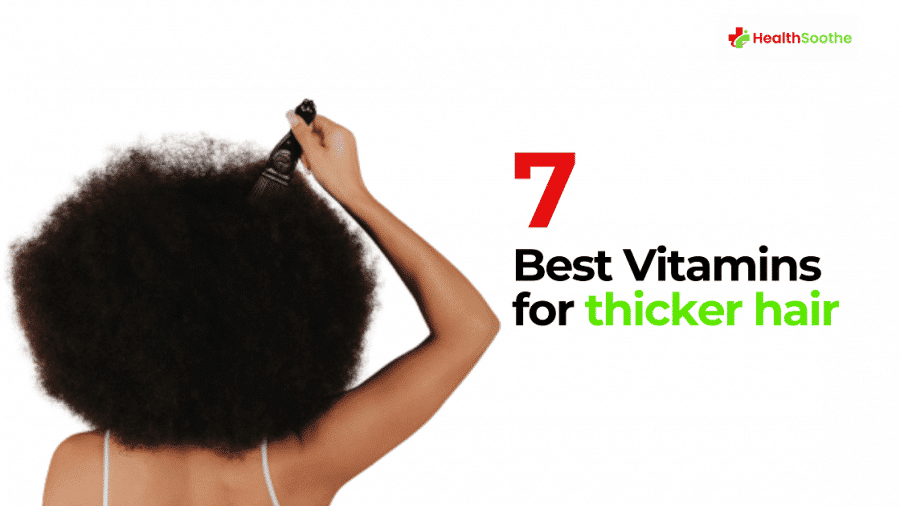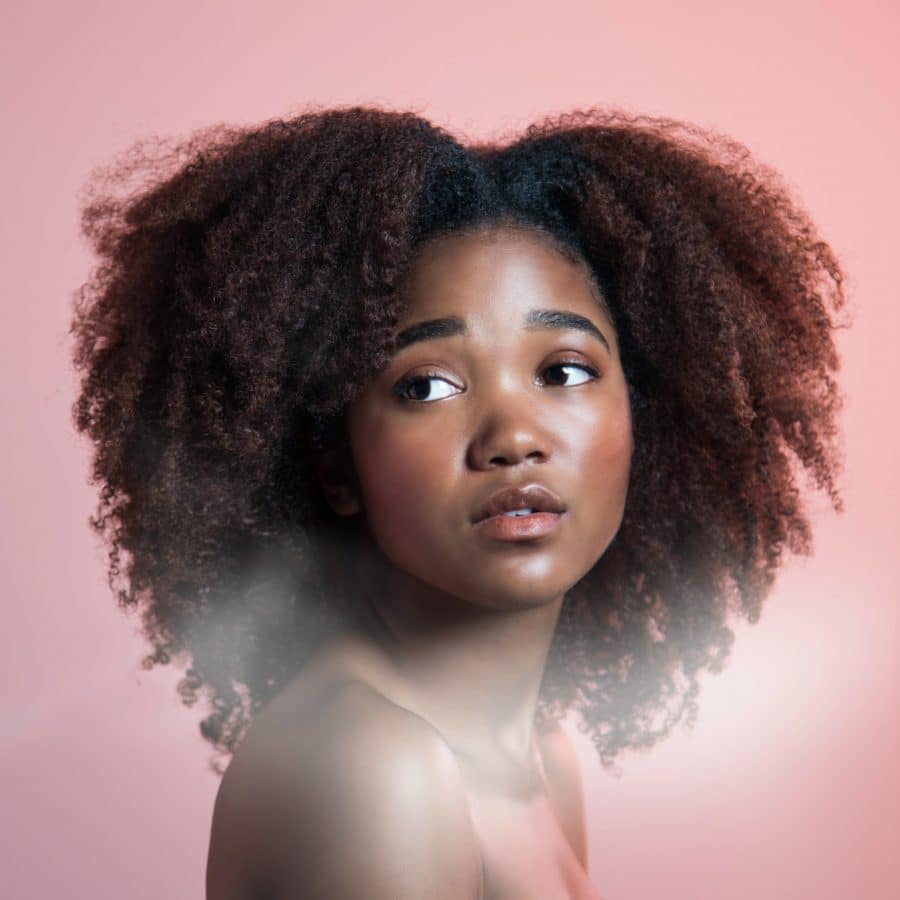You will need to grow your hair naturally sooner or later, and finding the best vitamins for healthier thicker hair would be one of the first recommendations by a dermatologist.
I understand that feeling when you lose some hair, it's possible that your recent dramatic chop was a bit shorter than you had expected, or that you're trying to give your naturally thin hair a little more volume.
If you're trying to prevent breakage and maintain your hair healthy, you may also want to consider a hair growth vitamin or supplement to give your hair an additional boost.
Healthy hair is seen as a sign of both health and attractiveness by many individuals. All parts of your body require a variety of nutrients to function properly, including your hair.
Hair loss has been related to certain nutritional deficits.
In addition to age, genetics, and hormones affecting hair development, proper vitamin intake is essential.
If any of these appeals to you, you don’t have to worry again as this article is the last you’d read about the best vitamins for thicker hair, believe me, it’ll cover everything you may really want to know.
Recommended for you: Natural Ways To Revitalize Your Facial Skin And Hair
What vitamins are beneficial to hair?
B complex vitamins, iron, protein, and vitamin D are often included in over-the-counter hair growth and thickness pills, according to experts. I'm aware that low amounts of these vitamins are linked to hair loss.
B12 supplements, which help build new hair cells and stimulate growth, are recommended if you have previously suffered hair loss.
You should be aware of the RDA (recommended daily amount) of each component, as with any supplement.
This is particularly crucial if you're taking iron or vitamin A supplements, since both may have negative side effects if taken in excess.
1. Vitamin A is good for thicker hair
Vitamin A is required for the development of all cells. Hair, the body's fastest-growing tissue, is included in this category.
It also aids the skin's ability to produce sebum, which is an oily material. As a natural moisturizer for the scalp, sebum also aids in hair health.
Many health issues, including hair loss, may result from a deficiency of vitamin A in the diet.
Vitamin A is essential, but you don't want to overdo it. Vitamin A deficiency has been linked to hair thinning in several studies.
Vegetables and fruits strong in beta-carotene, the precursor of vitamin A, may be found in abundance in a number of common winter vegetables.
It's possible to get vitamin A via consuming dairy products such as milk and yogurt. Cod liver oil is an excellent source of omega-3 fatty acids.
2. Vitamins B1 and B12
In terms of vitamins for hair development, biotin is one of the most popular. Hair loss has been linked to a lack of biotin in people, according to research.
Biotin is utilized as an alternate therapy for hair loss, however, individuals who are lacking in the vitamin have the greatest outcomes.
Because it can be found in such a broad variety of foods, vitamin D insufficiency is quite uncommon. Biotin hasn't been studied to see whether it promotes hair growth in healthy people.
Additionally, the body uses other B vitamins to produce red blood cells, which transport oxygen and nutrients to the scalp. These mechanisms are critical to the development of hair.
Many foods include B vitamins, such as:
- grains in their natural state
- green leafy vegetables such as spinach
- almonds
- meat
- fish
- seafood
Vitamin B12 can only be found in animal products. A vegan or vegetarian diet may need the use of a nutritional supplement.
3. Vitamin C
Damage from free radicals may halt hair development and accelerate the aging process. A strong antioxidant, vitamin C helps to counteract oxidative stress generated by free radicals.
Vitamin C is also necessary for the production of collagen, a protein that is crucial to the structure of the hair.
Iron, an essential element for hair development, is made more readily available to your body by vitamin C. Vitamin C-rich foods include strawberries, peppers, guavas, and citrus fruits.
4. Vitamin D Boosts hair
Vitamin D is a vital component of a healthy diet. Low vitamin D levels have been related to hair loss, a condition known as alopecia.
Research on vitamin D receptors suggests that it may have a role in hair growth. Vitamin D's effect on hair development is still a mystery.
Vitamin D, on the other hand, is lacking in most people's diets. Increasing your consumption may still be a smart option.
Vitamin D is produced in your body when you are exposed to the sun's rays. Vitamin D may be found in a variety of foods, including:
- Saturated fat from fish
- oil from cod's liver
- a few shiitakes
- dietary supplements
5. Vitamin E
Vitamin E, like vitamin C, is an antioxidant that may aid in the prevention of oxidative damage.
After taking vitamin E for 8 months, persons with hair loss had a 34.5 percent boost in hair growth, according to one research.
There was just a 0.1 percent gain in the placebo group.
Vitamin E may be found in sunflower seeds, almonds, spinach, and avocados.
6. Iron
Iron aids the transport of oxygen to your cells via red blood cells. As a result, it's essential for a variety of body activities, including hair development.
Anemia, which is caused by an iron shortage, is a primary cause of hair loss. It's more frequent in women than in males.
Clams, oysters, eggs, red meat, spinach, and lentils are all rich in iron.
Read Also: Gummies or Candies? What would you prefer for healthy hair?
7. Zinc is good for thicker hair
Zinc is necessary for the development and repair of hair tissue. It also aids in the normal functioning of the oil glands around the follicles.
A typical sign of zinc deficiency is hair loss. According to studies, addressing zinc insufficiency with supplementation may minimize hair loss caused by deficiency.
However, some anecdotal evidence suggests that supplementing with a high dose might cause hair loss.
As a result, getting zinc from whole meals may be preferable. Oysters, steak, spinach, wheat germ, pumpkin seeds, and lentils are all rich in zinc.
8. Protein
Hair is nearly completely made up of protein. It's important to eat enough to promote hair development.
Protein deficit has been shown in animal studies to reduce hair development and even cause hair loss.
Actual protein insufficiency, on the other hand, is relatively uncommon in Western nations.
Key points to note on “best vitamins for thicker hair”
- To keep hydrated and thrive, your hair needs vitamin A. Sweet potatoes, carrots, spinach, kale, and certain animal meals are also good sources.
- B vitamins stimulate hair development by transporting oxygen and nutrients to the scalp. B vitamins may be found in whole grains, meat, fish, and dark, leafy greens.
- Vitamin C is required for the production of collagen and may aid in the prevention of hair aging. Peppers, citrus fruits, and strawberries are all good sources.
- Although the exact function of vitamin D in hair development is unknown, one kind of hair loss has been related to vitamin D deficiency. Vitamin D levels may be raised by sun exposure or by consuming particular foods.
- Vitamin E protects the hair from oxidative stress and promotes hair development. Sunflower seeds, almonds, spinach, and avocados are all good sources.
- Hair loss is caused by an iron deficiency, which is more common in women. Clams, oysters, eggs, red meat, spinach, and lentils are excellent sources of iron.
- In persons who are weak in zinc, hair growth may be improved. Oysters, meat, and pumpkin seeds are all good sources.
Check this out: Answered - Is Aloe Vera the Solution to Your Hair Fall Problem?
In conclusion
The greatest way to get the best vitamins you need for thicker hair is through food. Supplements, on the other hand, maybe useful if you don't receive enough through your food. Although, they function best in those who are already deficient.
Furthermore, if you aren't low in vitamins and minerals, high dosages might be dangerous. To see a physician see whether you have a deficit.
The best method to receive these nutrients is to consume a well-balanced, whole-foods–based diet that contains lots of nutrient-dense meals.


